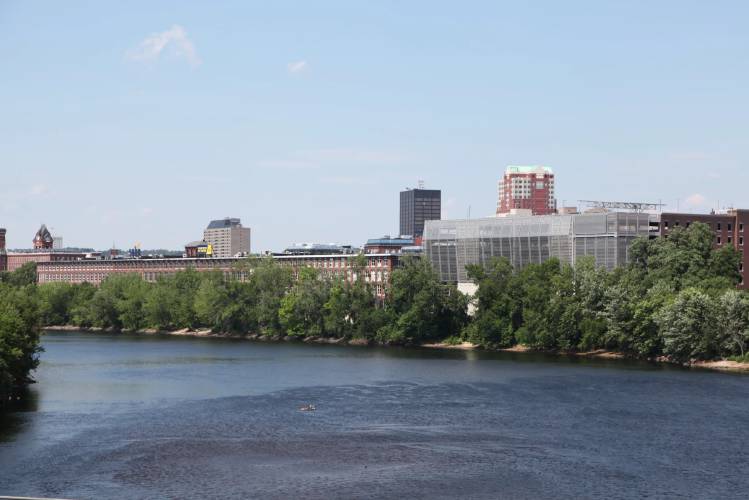Along the Merrimack River, a No. 1 year ... for No. 2

Part of the Merrimack River in Manchester. Gaby Lozada / NHPR
| Published: 02-02-2024 11:19 AM |
About 2 billion gallons of raw sewage mixed with stormwater runoff flowed into the Merrimack River last year, blowing the previous record for sewer overflows out of the water.
The Merrimack River Watershed Council has only been keeping track of the data since 2013. (That was the first year public data was available from all five places that discharge sewage into the river.) But the council says last year’s totals were far higher than anything they’ve seen before. The previous record, 823 million gallons, was set in 2021.
“It’s clear to us that it’s a combination of climate change and the impacts of increased rain, as well as the continued development along the river, which leads to straining current infrastructure,” said Curt Rogers, who leads the council.
Sewer overflows tend to happen when some older systems — called “combined sewers,” since they collect both rainwater and sewage in the same lines — are hit with heavy rain. The mixture can overwhelm the lines, which can then, in turn, direct untreated sewage into the river so it doesn’t back up into basements and streets.
Last year also saw New Hampshire’s wettest summer on record. Throughout June and July, the Merrimack River was under sewer overflow-related advisories for 39 total days, according to the watershed council.
As climate change drives more extreme rainfall and flooding in New Hampshire, Rogers said combined sewer overflows are a lesser-known but important consequence.
Each overflow event creates a public health hazard in the river for about 48 hours. Samples taken by the Merrimack River Watershed Council show that unsafe levels of bacteria often linger in the river following these discharges.
“If you’re on the river, you’re seeing the river more brown,” Rogers said. “You’re actually possibly seeing what might be politely referred to as ‘floatables.’ It’s a pretty disgusting situation.”
Article continues after...
Yesterday's Most Read Articles
Between 500,000 and 700,000 people get their drinking water from the Merrimack River. Drinking water that comes from the river is treated and safe to drink, Rogers said, but many people don’t know where it comes from.
Sewer overflows affect about 700 communities across the U.S., but fixing the problem can be expensive and difficult.
In New Hampshire, Manchester had the highest volume of sewer overflow into the Merrimack in 2023. Officials there are working on a project to reduce discharges, but they say it could cost more than $300 million and could represent one of the largest public works undertakings in Manchester history. The project in total is expected to take 20 years.
Sewer overflows are also a matter of environmental justice, Rogers said. Most of the communities struggling to update their infrastructure are historically under-resourced. And though federal money is increasingly available for these issues, sometimes communities have trouble applying for government contracts or don’t have enough operating cash to take on projects, he said.
“Some of these municipalities are municipalities that are already strained financially and have other pressing, very valid financial needs,” Rogers said. “One of the first things that needs to happen is for the public to come together and get behind this issue, identify that it’s something that needs to be addressed.”
These articles are being shared by partners in The Granite State News Collaborative. For more information visit collaborativenh.org.







 Baseball: Slow night at the plate costs Concord in loss to Windham, 3-1
Baseball: Slow night at the plate costs Concord in loss to Windham, 3-1 ‘It's like slow genocide’: Crowd rallies against proposed Medicaid cuts
‘It's like slow genocide’: Crowd rallies against proposed Medicaid cuts New Hampshire births fell to a modern low in 2024
New Hampshire births fell to a modern low in 2024 ‘New Hampshire is just going to embarrass itself’: Former Child Advocate warns against proposed office cuts
‘New Hampshire is just going to embarrass itself’: Former Child Advocate warns against proposed office cuts
